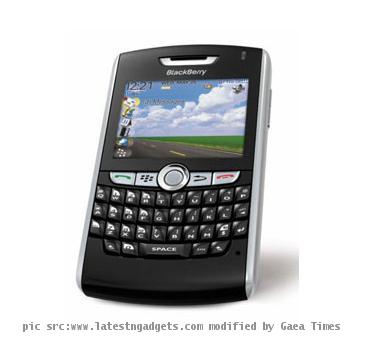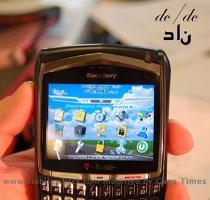India BlackBerry ban averted, Research In Motion has 60 more days to finalize security fixes
By APMonday, August 30, 2010
India BlackBerry ban averted for 60 more days
MUMBAI, India — India said it withdrew a threat Monday to ban BlackBerry services for at least two more months after the device’s maker, Research In Motion Ltd., agreed to give security officials “lawful access” to encrypted data.
The Ministry of Home Affairs, which wants real time access to encrypted corporate e-mails and instant messaging, said in a statement it would review RIM’s security proposals over the next 60 days after the Department of Telecommunications studies the feasibility of routing BlackBerry services through a server in India.
It remains unclear precisely what concessions Research In Motion agreed to in order to avert the ban.
About 1 million BlackBerry users would have been affected in India.
“RIM have made certain proposals for lawful access by law enforcement agencies and these would be operationalized immediately. The feasibility of the solutions offered would be assessed thereafter,” the ministry said.
Home Secretary G.K. Pillai met officials from the Department of Telecommunications, the Intelligence Bureau and the National Technical Research Organization — a cyberintelligence organization — on Monday to discuss BlackBerry security issues, Home Ministry spokesman Onkar Kedia said.
Research In Motion, a Canadian company, has been reluctant to agree to New Delhi’s demands for real-time access to encrypted corporate e-mail, saying previously it is technically impossible to provide. RIM has also said it is a “misperception” to think server location has any bearing on a government’s ability to access encrypted information.
RIM maintains that it has a consistent global standard for data access and does not do special deals with individual countries.
A RIM spokesman in India declined comment.
Developments in India on Monday echo Saudi Arabia’s decision earlier this month to suspend a planned ban. Saudi officials said they had reached a preliminary agreement with RIM to place a server in the country to facilitate monitoring, but it’s unclear whether the reprieve will become permanent.
RIM is facing widespread concern over its strong data encryption, which is beloved by corporate customers eager to guard secrets, but troublesome for some governments in the Middle East and Asia that worry it could be used by militants to avoid detection.
The controversy, which reaches across Saudi Arabia, the United Arab Emirates, Indonesia, Lebanon and India, sent Research In Motion’s stock price to a 16-month low Friday.
PricewaterhouseCoopers executive director Sandeep Ladda said it would have been politically difficult for India to ban BlackBerry services Tuesday, given the number of Indian users.
“There could have been a public uproar,” he said. “A lot of negative publicity on the government of India would have come up in the media.”
The decision by Nokia Corp. — Research In Motion’s major competitor in India — to install a server in the country to facilitate government monitoring may have weakened RIM’s position. Nokia India Managing Director D. Shivakumar told reporters Monday the company will install a server in India in November to ensure government access to data.
Krishnan Viswanathan, a 37-year-old broker in Mumbai, greeted the government’s decision Monday with indifference. He said he would keep using his BlackBerry if the security issues get put to rest. Otherwise, he’ll switch full-time to his second phone, a Nokia E72.
“For somebody who’s only having BlackBerry, they would be relieved definitely,” he said. “I use BlackBerry only for e-mail purposes. It doesn’t make much of a difference. I can always access it through my other phone.”
His Nokia smartphone is equipped with so-called pushmail, which allows automatic forwarding of his company e-mail.
Striking the right balance between national security and corporate privacy is especially important to Indian outsourcing companies eager to protect client data.
“India is termed an outsourcing hub for the U.S. and Europe, so data security is a primary issue. If there is any data leakage, we lose business,” said Chetan Samant, a manager at a software association. He said he personally would be sad to part with his BlackBerry. “Once you get used to it, it’s an addiction,” Samant said.
Indian officials say while they’re not eager to ban the BlackBerry, they won’t compromise on national security.
Security concerns flared after the terrorist attack on Mumbai in November 2008, which was coordinated using mobile phones, satellite phones and voice-over Internet phone calls.
Fears that the Commonwealth Games — a major sporting event to be held in New Delhi in October — could be a target for attacks have added pressure on the Home Ministry to step up surveillance.
India also faces worsening violence in the disputed region of Kashmir and a rising Maoist insurgency in a mineral-rich swath in the east that the government is eager to control.
Research In Motion last week sought to broaden the debate over security, saying singling it out for scrutiny was “ineffective and counterproductive.” Its proposal to lead an industrywide forum on security issues received a weak response from Indian telecom groups.
Indian officials have also raised concerns about Skype and Google, though both companies say they’ve yet to receive formal notice of an inquiry.
Some analysts say BlackBerry’s super-encrypted corporate e-mails are unlikely to be used by militants, who prefer more anonymous technologies, like Gmail.
Others, however, caution it would be easy for a militant group to set up a front corporation, which could then establish its own uncrackable BlackBerry corporate e-mail, considered by many to be the gold standard for data security.
Associated Press writer Ashok Sharma contributed to this report from New Delhi.
Tags: Asia, Communication Technology, Computer And Data Security, Computing And Information Technology, Consumer Electronics, India, Internet Technology, Middle East, Mobile Communications, Mumbai, National Security, New Delhi, Saudi Arabia, Software Outsourcing, South Asia

